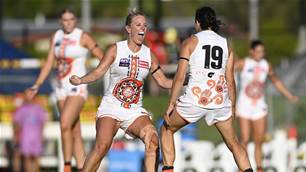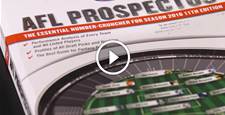Leonine Mick Malthouse, who, in costume, made the corporate buttoned and badged tacky black-and-white tracky almost debonair.
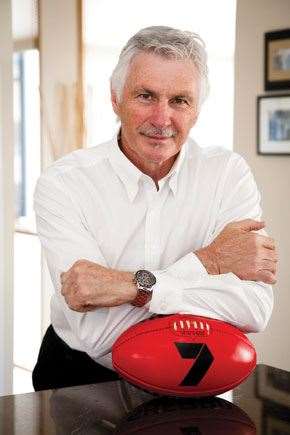 photos by Getty Images
photos by Getty Images
Where do you find inspiration? What do you read, watch, listen to? As a coach you’ve got to be abreast of things. Nothing stays the same. You’re either part of change or you invent change. I read } history more than anything. I’m reading a history of Jerusalem. It gives me an insight. I’ve always wanted to visit it. I’ve read a fair bit on Afghanistan. I want to know why our troops are there and what they’re up against. I read about great people. History shapes the next phase of our lives.
Do you feel potential was lost - that a lot more could’ve been done - when you left coaching? That was the contract. It wasn’t going to change. Move on. Once you’re a coach, you’re always a coach. Barassi will always be a coach. Allan Jeans died a coach. I won’t say I don’t miss it, but you’ve got to take the great times – I’ve been able to represent five clubs as a player and coach. I’ll take those times and redesign the rest of my life, use some of those components – discipline, structure, teamwork.
You’ve been around long enough for your coaching career to be described as an epic. What chapters stand out? I got sacked first game I played, for St Kilda, the last practice match. Told I wasn’t going to make it. Sent back to Ballarat. If you accept what sometimes seems inevitable ... I wouldn’t be sitting here, for a start. I was invited back to play reserves and by the end of the year I’d played three seniors finals. It started with luck, but I started to play okay. I could’ve got more out of myself, looking back. I could’ve worked harder. But I know that when I was done, I didn’t have one game left in me. So, to go and coach Footscray... again, how that came about was a mystery. Well, it turned out the preparation I did as a player helped. Then West Coast gave me an opportunity. Then Collingwood. To go from St Kilda to Richmond - Paddy Guinane and Alan Schwab gave me an opportunity. It’s what you do with it. Grab it, work hard and you never know what’s around the corner. Wasn’t all beer and skittles; Collingwood were bottom, West Coast 11th, Bulldogs hadn’t been in finals for years. You haven’t coached until you’ve coached a bottom side, under massive pressure. Don’t rate yourself until your fourth or fifth year. The first couple are honeymoon, the third year they’re starting to sort you out, fourth you’d have to show something to get that side in a good position. On the other hand, the moment you start to think you’re the reason those things have occurred – one, you’ve got a big head, and two, it’s incorrect.
So, going against popular belief, premierships are not the measure of a sporting coach? In 1985, Footscray made the finals. In ‘86, we were under financial pressure. In ’87, we were forced to sell players, we had a lot of under 19s kids in the seniors, no seconds, we lost the first three games by 42 goals and played the reigning premiers in round four. We won, and made the finals by half a game. That was one of my better years. I suppose it’s what you do with a club. Do you leave it in a position to be defended? Is it financially set? Is it player-sound? Has it got credibility? Has a good supporter base been taken on a good ride? There’s a lot of ways to look at a coach. Brad Scott’s done a wonderful job at North. I see a stable organisation. Only one side’s going to win a premiership. Success is measured in many ways.
So what about 2002-3? Fantastic. Brisbane were a fantastic side. To get where we got from 1999 was a wonderful achievement for all the people at the club.
Who are the heroes of your story? People who think they’re on the periphery, but the club can’t do without them. Rain or sun, good years, bad years. Successful players sometimes become successful people. Stephen Wallace Andrew Purser, Dougie Hawkins in his own way. Brian Royal, Glen Jakovich, Guy McKenna, John Worsfold. Rob Wiley. Many are heroes in my eyes. Paul Licuria, Anthony Rocca, Scott Burns, Jimmy Clements - outstanding people, outstanding family men, outstanding individuals.
In 2010 and 2011, elements of the media would’ve given anything to see cracks in the Collingwood plan to hand over to Buckley. Did you guys feel any pressure? You’ve got to ignore things that don’t relate to your job. I’ve never viewed coaching as a right. It’s a privilege. I was always part of a team, not an individual. You’re the most visible. I did the job I thought was best for the club and respected everyone’s position, because certain jobs are not easy. The club itself, the supporters and players, are too important to get embroiled in petty things that could destabilise it. I thought we lost momentum in 2011. It’s a credit to the players that they stayed as focused as they did. If you had that year again, you’d like to see it flipped over. We had momentum early. If we had injuries and suspensions early, we’d have lost a few, but we’d have recaptured momentum and gone into the finals with better preparation.
What personal philosophy helped you to balance it all and still come out a success? Part of my job is to ensure what players do as individuals is good for the team. You’ve got to feed the egos enough, but we only succeed with a common goal. If at times I haven’t liked the attitude of certain people, you have to make a decision. Some have moved on. Football clubs are not about being everyone’s best mate. You’ve got to balance it all, respect one another. I respect Eddie and his role, the administrators and their roles, the players and their roles. When they break from those roles and make parts of the organisation crumble, you’ve got to make sure it doesn’t permeate. That’s the first sign that the organisation will fail.
What was that rocky relationship with the media all about? You get painted as a person with no media friends. That’s not the case. The game can’t exist without media, and the football media can’t exist without the game. I like to think they’ve done their homework, listen, respond to the answers, and respect the fact that the interview’s often not long after the game. The thing about me and journalists is bizarre; you have one argument and you’re tarred that you don’t get on with anyone.
Related Articles
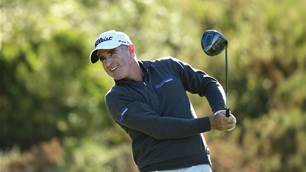
Video interview: Drinks With ... Matt Millar
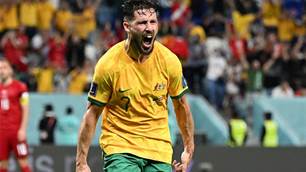
Socceroo star's message to kids: Don't be an AFL player
